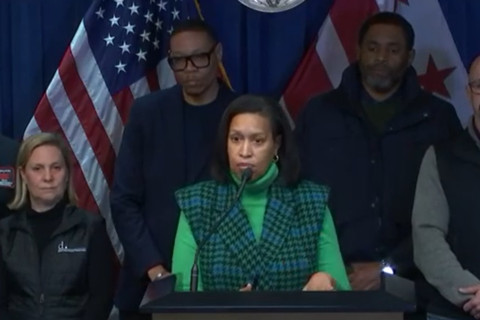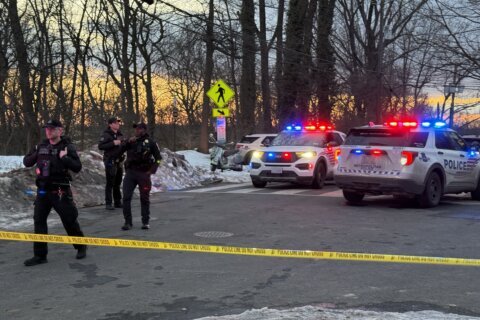The head of the District of Columbia’s emergency call center tells WTOP “there is not a systematic problem with DC 911,” in response to allegations that fire and EMS crews have been sent to wrong addresses more times this year than the last five years combined.
Safety advocate Dave Statter, a former reporter, has been posting radio transmissions on his Statter911 site that document D.C. Fire and EMS crews being dispatched to wrong, or in some cases nonexistent addresses, more than three dozen times since December.
Statter says that number dwarfs the 21 instances of “blown addresses” reported in the past five years to the D.C. Council’s Judiciary and Public Safety Committee during its yearly oversight of the OUC’s performance.
“Was OUC under-reporting in previous years, or is there suddenly a big problem that they’re sending [crews] to many more bad addresses than in years past,” Statter asked.
In an interview with WTOP, Karima Holmes, director of the D.C. Office of Unified Communications, said suggesting there is a spike in mistaken dispatches is incorrect, and in her words, “irresponsible.”
“There is not a systematic problem with DC 911,” said Holmes. “Sometimes the information gets tangled and an error is made.”
Holmes said there can be many contributing factors in trying to gather information from a concerned citizen, and dispatching first responders toward an emergency.
“There are times when we do make a mistake. There are times when the caller provides us a wrong address, and there are times when we give an address correctly and the responders interpret that address incorrectly,” said Holmes.
She said D.C.’s call-takers smoothly dispatch crews more than a million times every year.
“When someone calls 911, my call-takers attempt to verify the address multiple times during the call-handling process, before it even goes to dispatch,” she said.
On his website, Statter posted snippets of radio communications that include firefighters informing dispatchers that homes or businesses don’t exist, when they arrive at an address to which they’ve been sent.
“Many times the dispatchers don’t know the locations and don’t understand the geography of D.C., and if they can’t know it themselves they can’t help those who are calling 911,” said Statter.
Statter said first responders are hampered when they have to do the detective work in determining a proper address. “When you lose minutes in a situation where seconds count, you have a big problem, and people suffer,” he said.
Holmes said call-takers receive thorough, and ongoing training on how to help ascertain a location from a person in need: “People are frantic, they don’t always know exactly where they are. They sometimes get the incorrect address or wrong quadrant of the city. And sometimes the call is made by a third-party caller, who may not even be at the location.”
She said split-second decisions are made based on a variety of factors. “You can’t just listen to snippets of radio transmissions, to understand the full capacity of what set an emergency response in motion,” Holmes said. “It just doesn’t tell the full story.”
Statter said the number of recent incidents he’s documented is far greater than the 21 incidents OUC reported to the council, during previous oversight hearings. Statter says, “Something’s a little out of whack here.”
Holmes was asked if she stands by the number of errant dispatches provided to the D.C. Council: “Of course. I take that very seriously,” she said. “I provided that information under oath.”
She said the number of incidents reported to the council document thoroughly investigated incidents, which include other factors, including 911 caller error.
Statter, whose career as a reporter included a stint at WTOP and many years with WUSA 9, is now in a safety advocate role.
Holmes is critical of Statter’s methods, saying he is leading “efforts, with the intent of eroding the public’s trust. That’s exactly what Dave Statter is trying to do.”
Statter has been critical of OUC not responding to his requests for information.
“The lack of transparency means we don’t know what’s going on there, we don’t know what the training is like, and we don’t know what has caused these bad addresses to be dispatched,” he told WTOP.
“D.C. 911 probably has more impact on the health and safety of people living in the Washington, D.C. area than any other public safety agency. They handle more calls about more serious situations, than any other police department, fire department, or 911 center, Statter said.
Ward 6 Councilmember Allen, the chair of the Committee on the Judiciary and Public Safety, tells WTOP he frequently reviews 911 calls when a potential issue comes to his attention, and when mistakes have been made by OUC, there has been accountability.
“We depend on fast-thinking staff to stay on the line, and then correct and relay that information to folks on the ground. That is the reality of 911: you’re calling at your worst moment, and you might not be fully aware of where you are or what’s going on around you.”
Allen said call-takers and dispatchers are doing “stressful, challenging work, and happening at a time when call volume is incredibly high.”
“I know Director Holmes is dedicated to always improving her agency’s performance to get the right care to District residents,’ Allen said.








